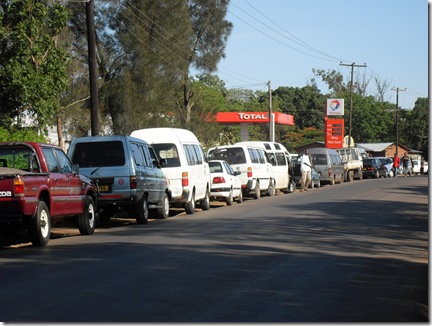Def’n of Inflation: “A sustained rise in the general level of prices.” [1]
Inflation causes all kinds of trouble for an economy. Controlling it, steadying it, has been a major policy priority since at least World War II, if not before. In that time inflation has crippled more than one developing economy (for a recent example, think Zimbabwe).
I’ve read about inflation, but until recently, I’ve never lived it, at least not in a noticeable way. All that changed last week. The story isn’t tragic or anything, but it’s interesting.
Last December, Malawi went through a major fuel shortage. The cause was (eventually) linked to a lack of foreign currency to buy fuel. The lack of currency was then linked to a fixed exchange rate regime – 140 Kwacha to the US dollar – that had long-since been outpaced by the black market (where the US dollar was trading at above K180).
A line-up at a filling station during the fuel-shortage, on only the suspicion that a delivery of diesel might turn up. (The line extended far beyond the picture)
The first fuel crisis was eventually arrested by borrowing a large fund of foreign currency, and by putting in place domestic fuel rationing. The crisis was ended, but the fund just ran out this month. Finally, with another fuel crisis possibly approaching, Malawi relaxed its exchange rate…a little bit. The US dollar is now trading in banks at around 160 Kwacha. The effects have been fairly immediate.
First, the price of fuel went up from about K215/L to about K250/L (a 16% increase, following closely with the 14% change to the Kwacha’s value). This led minibus rates to increase; for instance one standard in-city rate in Lilongwe went up from K80 to K100, at 20% increase (count on minibus owners to milk any change in the fuel price for all they can). So, a 14% decrease in the value of the currency led to a 16% increase in the cost of fuel which led to a 20% increase in the cost of transport. See where this is going?
Fuel’s not the only thing going up. Yesterday I was trying to buy units for my pay-as-you go cell-phone. Units are denominated in “dollars” each of which costs K140. I go to the counter.
“I’d like a dollar of Zain please.”
“That’ll be 160.”
“160?!?!?”
“The price has changed.”
“When?”
“Today.”
Showing the power of this kind of thing, vendors also immediately started charging K160/dollar for TNM units (the other major cell-phone company in Malawi) until we all received a text message on our TNM phones saying that the price hadn’t changed.
So, an abrupt change to the exchange rate has quickly led to a change in cost of two major services, both import reliant: transportation and communication. I wonder what else is going to go up? With two fairly basic necessities increasing in price, other prices might have to increase just so that people can keep up. With a large informal economy, and few people tied down with salaries and contracts, this can happen quite quickly. Hopefully it doesn’t get out of control…although I doubt it will. Still, it’s interesting to see it first hand.
Right now though, even if things don’t get out of control, I’m going to posit that this inflation still sucks for average Malawians. Everyone here earns their income (formal or informal) in Kwacha, not in US dollars, and now that income is starting to buy less. Continued price rises will compensate some people (those selling), but not everyone. Life here is probably about to get a little bit harder.
Meanwhile though, it’s kind of necessary. The fixed exchange rate regime was a major contributor to the recent fuel shortage, which in turn crippled the entire country for more than a month. That was also hard. I guess it’s all about tradeoffs. We’ll see how this one plays out.
[1] Blanchard, Olivier, Macroeconomics, 5th Edition, Glossary


